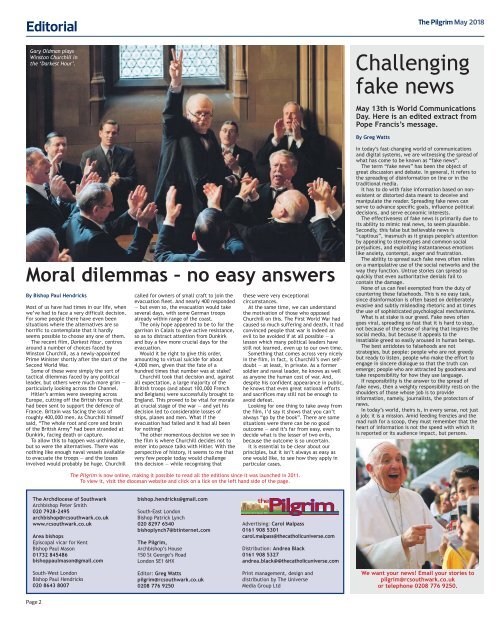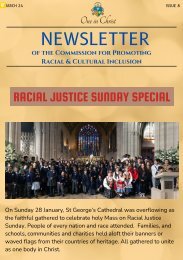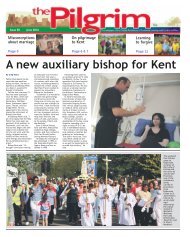Issue 71 - The Pilgrim - May 2018 - The newspaper of the Archdiocese of Southwark
The May 2018 issue of "The Pilgrim", the newspaper of the Archdiocese of Southwark
The May 2018 issue of "The Pilgrim", the newspaper of the Archdiocese of Southwark
You also want an ePaper? Increase the reach of your titles
YUMPU automatically turns print PDFs into web optimized ePapers that Google loves.
Editorial<br />
<strong>The</strong> <strong>Pilgrim</strong> <strong>May</strong> <strong>2018</strong><br />
Gary Oldman plays<br />
Winston Churchill in<br />
<strong>the</strong> ‘Darkest Hour’.<br />
Challenging<br />
fake news<br />
<strong>May</strong> 13th is World Communications<br />
Day. Here is an edited extract from<br />
Pope Francis’s message.<br />
By Greg Watts<br />
Moral dilemmas – no easy answers<br />
By Bishop Paul Hendricks<br />
Most <strong>of</strong> us have had times in our life, when<br />
we’ve had to face a very difficult decision.<br />
For some people <strong>the</strong>re have even been<br />
situations where <strong>the</strong> alternatives are so<br />
horrific to contemplate that it hardly<br />
seems possible to choose any one <strong>of</strong> <strong>the</strong>m.<br />
<strong>The</strong> recent film, Darkest Hour, centres<br />
around a number <strong>of</strong> choices faced by<br />
Winston Churchill, as a newly-appointed<br />
Prime Minister shortly after <strong>the</strong> start <strong>of</strong> <strong>the</strong><br />
Second World War.<br />
Some <strong>of</strong> <strong>the</strong>se were simply <strong>the</strong> sort <strong>of</strong><br />
tactical dilemmas faced by any political<br />
leader, but o<strong>the</strong>rs were much more grim —<br />
particularly looking across <strong>the</strong> Channel.<br />
Hitler’s armies were sweeping across<br />
Europe, cutting <strong>of</strong>f <strong>the</strong> British forces that<br />
had been sent to support <strong>the</strong> defence <strong>of</strong><br />
France. Britain was facing <strong>the</strong> loss <strong>of</strong><br />
roughly 400,000 men. As Churchill himself<br />
said, “<strong>The</strong> whole root and core and brain<br />
<strong>of</strong> <strong>the</strong> British Army” had been stranded at<br />
Dunkirk, facing death or capture.<br />
To allow this to happen was unthinkable,<br />
but so were <strong>the</strong> alternatives. <strong>The</strong>re was<br />
nothing like enough naval vessels available<br />
to evacuate <strong>the</strong> troops — and <strong>the</strong> losses<br />
involved would probably be huge. Churchill<br />
called for owners <strong>of</strong> small craft to join <strong>the</strong><br />
evacuation fleet. And nearly 400 responded<br />
— but even so, <strong>the</strong> evacuation would take<br />
several days, with some German troops<br />
already within range <strong>of</strong> <strong>the</strong> coast.<br />
<strong>The</strong> only hope appeared to be to for <strong>the</strong><br />
garrison in Calais to give active resistance,<br />
so as to distract attention from Dunkirk<br />
and buy a few more crucial days for <strong>the</strong><br />
evacuation.<br />
Would it be right to give this order,<br />
amounting to virtual suicide for about<br />
4,000 men, given that <strong>the</strong> fate <strong>of</strong> a<br />
hundred times that number was at stake?<br />
Churchill took that decision and, against<br />
all expectation, a large majority <strong>of</strong> <strong>the</strong><br />
British troops (and about 100,000 French<br />
and Belgians) were successfully brought to<br />
England. This proved to be vital for morale<br />
at crucial stage <strong>of</strong> <strong>the</strong> war — and yet his<br />
decision led to considerable losses <strong>of</strong><br />
ships, planes and men. What if <strong>the</strong><br />
evacuation had failed and it had all been<br />
for nothing?<br />
<strong>The</strong> o<strong>the</strong>r momentous decision we see in<br />
<strong>the</strong> film is where Churchill decides not to<br />
enter into peace talks with Hitler. With <strong>the</strong><br />
perspective <strong>of</strong> history, it seems to me that<br />
very few people today would challenge<br />
this decision — while recognising that<br />
<strong>the</strong>se were very exceptional<br />
circumstances.<br />
At <strong>the</strong> same time, we can understand<br />
<strong>the</strong> motivation <strong>of</strong> those who opposed<br />
Churchill on this. <strong>The</strong> First World War had<br />
caused so much suffering and death, it had<br />
convinced people that war is indeed an<br />
evil to be avoided if at all possible — a<br />
lesson which many political leaders have<br />
still not learned, even up to our own time.<br />
Something that comes across very nicely<br />
in <strong>the</strong> film, in fact, is Churchill’s own selfdoubt<br />
— at least, in private. As a former<br />
soldier and naval leader, he knows as well<br />
as anyone <strong>the</strong> human cost <strong>of</strong> war. And,<br />
despite his confident appearance in public,<br />
he knows that even great national efforts<br />
and sacrifices may still not be enough to<br />
avoid defeat.<br />
Looking for one thing to take away from<br />
<strong>the</strong> film, I’d say it shows that you can’t<br />
always “go by <strong>the</strong> book”. <strong>The</strong>re are some<br />
situations were <strong>the</strong>re can be no good<br />
outcome — and it’s far from easy, even to<br />
decide what is <strong>the</strong> lesser <strong>of</strong> two evils,<br />
because <strong>the</strong> outcome is so uncertain.<br />
It is essential to be clear about our<br />
principles, but it isn’t always as easy as<br />
one would like, to see how <strong>the</strong>y apply in<br />
particular cases.<br />
In today’s fast-changing world <strong>of</strong> communications<br />
and digital systems, we are witnessing <strong>the</strong> spread <strong>of</strong><br />
what has come to be known as “fake news”.<br />
<strong>The</strong> term “fake news” has been <strong>the</strong> object <strong>of</strong><br />
great discussion and debate. In general, it refers to<br />
<strong>the</strong> spreading <strong>of</strong> disinformation on line or in <strong>the</strong><br />
traditional media.<br />
It has to do with false information based on nonexistent<br />
or distorted data meant to deceive and<br />
manipulate <strong>the</strong> reader. Spreading fake news can<br />
serve to advance specific goals, influence political<br />
decisions, and serve economic interests.<br />
<strong>The</strong> effectiveness <strong>of</strong> fake news is primarily due to<br />
its ability to mimic real news, to seem plausible.<br />
Secondly, this false but believable news is<br />
“captious”, inasmuch as it grasps people’s attention<br />
by appealing to stereotypes and common social<br />
prejudices, and exploiting instantaneous emotions<br />
like anxiety, contempt, anger and frustration.<br />
<strong>The</strong> ability to spread such fake news <strong>of</strong>ten relies<br />
on a manipulative use <strong>of</strong> <strong>the</strong> social networks and <strong>the</strong><br />
way <strong>the</strong>y function. Untrue stories can spread so<br />
quickly that even authoritative denials fail to<br />
contain <strong>the</strong> damage.<br />
None <strong>of</strong> us can feel exempted from <strong>the</strong> duty <strong>of</strong><br />
countering <strong>the</strong>se falsehoods. This is no easy task,<br />
since disinformation is <strong>of</strong>ten based on deliberately<br />
evasive and subtly misleading rhetoric and at times<br />
<strong>the</strong> use <strong>of</strong> sophisticated psychological mechanisms.<br />
What is at stake is our greed. Fake news <strong>of</strong>ten<br />
goes viral, spreading so fast that it is hard to stop,<br />
not because <strong>of</strong> <strong>the</strong> sense <strong>of</strong> sharing that inspires <strong>the</strong><br />
social media, but because it appeals to <strong>the</strong><br />
insatiable greed so easily aroused in human beings.<br />
<strong>The</strong> best antidotes to falsehoods are not<br />
strategies, but people: people who are not greedy<br />
but ready to listen, people who make <strong>the</strong> effort to<br />
engage in sincere dialogue so that <strong>the</strong> truth can<br />
emerge; people who are attracted by goodness and<br />
take responsibility for how <strong>the</strong>y use language.<br />
If responsibility is <strong>the</strong> answer to <strong>the</strong> spread <strong>of</strong><br />
fake news, <strong>the</strong>n a weighty responsibility rests on <strong>the</strong><br />
shoulders <strong>of</strong> those whose job is to provide<br />
information, namely, journalists, <strong>the</strong> protectors <strong>of</strong><br />
news.<br />
In today’s world, <strong>the</strong>irs is, in every sense, not just<br />
a job; it is a mission. Amid feeding frenzies and <strong>the</strong><br />
mad rush for a scoop, <strong>the</strong>y must remember that <strong>the</strong><br />
heart <strong>of</strong> information is not <strong>the</strong> speed with which it<br />
is reported or its audience impact, but persons.<br />
<strong>The</strong> <strong>Pilgrim</strong> is now online, making it possible to read all <strong>the</strong> editions since it was launched in 2011.<br />
To view it, visit <strong>the</strong> diocesan website and click on a lick on <strong>the</strong> left hand side <strong>of</strong> <strong>the</strong> page.<br />
<strong>The</strong> <strong>Archdiocese</strong> <strong>of</strong> <strong>Southwark</strong><br />
Archbishop Peter Smith<br />
020 7928-2495<br />
archbishop@rcsouthwark.co.uk<br />
www.rcsouthwark.co.uk<br />
Area bishops<br />
Episcopal vicar for Kent<br />
Bishop Paul Mason<br />
01732 845486<br />
bishoppaulmason@gmail.com<br />
bishop.hendricks@gmail.com<br />
South-East London<br />
Bishop Patrick Lynch<br />
020 8297 6540<br />
bishoplynch7@btinternet.com<br />
<strong>The</strong> <strong>Pilgrim</strong>,<br />
Archbishop’s House<br />
150 St George’s Road<br />
London SE1 6HX<br />
<strong>the</strong><br />
2012<strong>Pilgrim</strong><br />
50p<br />
December 2011/ January <strong>The</strong> <strong>newspaper</strong> <strong>of</strong> <strong>the</strong> Catholic <strong>Archdiocese</strong> <strong>of</strong> <strong>Southwark</strong>, covering s<br />
Advertising: Carol Malpass<br />
0161 908 5301<br />
carol.malpass@<strong>the</strong>catholicuniverse.com<br />
Distribution: Andrea Black<br />
0161 908 5327<br />
andrea.black@@<strong>the</strong>catholicuniverse.com<br />
South-West London<br />
Bishop Paul Hendricks<br />
020 8643 8007<br />
Editor: Greg Watts<br />
pilgrim@rcsouthwark.co.uk<br />
0208 776 9250<br />
Print management, design and<br />
distribution by <strong>The</strong> Universe<br />
Media Group Ltd<br />
We want your news! Email your stories to<br />
pilgrim@rcsouthwark.co.uk<br />
or telephone 0208 776 9250.<br />
Page 2


















